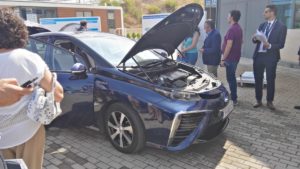The perdition of having a diesel car and the need to offer it: the market is sinking in Spain

The perdition of having a diesel car and the need to offer it: the market is sinking in Spain
Individuals are terrified of cars that use diesel,” Sebastian says. A repairman in Tenerife and an importer of second-hand vehicles. “Customers come to me to get 4×4 gas cars from the confusion of diesel,” he says. Pandora’s case was opened by Teresa Ribera, who served for the Ecological Transition, when she expressed that diesel “has the days controlled”.
The number of vehicle offers of this vibbo fuel – in the past known as second-hand – increases every day. At this point, there are more than 400 cars that use diesel available for purchase at a given cost. For example, a 2002 Smart Passion, which once cost 11,430 euros, is now sold for 800. A 1998 Galloper Exceed, which was exhibited for 16,287 euros, is currently promoted for 2,200 euros.
“In the event that I buy a car on the move, in any case I would buy diesel,” says Jacobo Vazquez, sales representative of Smart, who will buy another vehicle, urban and fuel. “There is much more interest in vehicles than in the use of fuel,” they say from the Alhambra Concessionaire in Madrid. There the circumstance began 8 months ago: “We have to express our gratitude to Carmena”. The conviction that the diesel engine is dirtier than the oil engine has extended the population. In addition, citizens fear “not having the capacity to enter Madrid” in the driver’s seat of a diesel engine. From Autos de Segunda Mano Argüelles, have also seen that “customers are very apprehensive with diesel and now ask for cars that are going to refuel.
“I don’t think diesel will disappear,” says Marcos, a Vibbo customer who offers a Volkswagen 97 transporter for 5,500 euros. “I present this truck to you to buy another one with diesel. A couple of years earlier we got it for 7,500 euros,” he says. He complains about the repercussions of the new arrangements for customers like him: “We are in the hands of the interests of huge organizations and governments. What was great yesterday is horrible today.
Diesel does not pollute?
“What the shepherdess has done, in the wake of her careless explanations, has been to erase both second-hand diesel advertising and the best and brightest,” says Mario Arnaldo, leader of European Automobile Associates. “Right now is an ideal opportunity to buy the diesel car, for someone with a dream of amortization. For him, no measure will have the ability to confine or limit the course of vehicles enlisted or promoted with this fuel.
“It is not valid that they are even dirtier,” Mario clarifies. Be that as it may, Teresa Ribera’s advertisements have spread disorder among the general population. “The problem is not the diesel,” says Arnaldo, “but the age of the vehicles. The old diesel, he clarifies, is the one that does not have a natural mark. This is the situation of vehicles produced and announced before 2006.
Mario mentions the case of leaded oil, the advertising of which was banned from 1 January 2002. “Some vehicles need to be changed or adjusted. Added substances were included, the auto assembly was restored,” he says. There is no compelling reason to produce wrinkles in automobile advertising.
Sebastian, as a worker, might want Spain to advance the use of hydrogen as a fuel. “I had an Audi A6 and I adjusted it to work with hydrogen, since it does not pollute. It did not pass the ITV. It is also related to an organization that has joined to create biodiesel, a fuel that has not been approved by the ITV.
The perplexity of the levy
The alert has gone off, not only because of the supposed disappearance of diesel, but also because of the expense that this fuel will entail. The new valuation would be about 38 euros per thousand liters, or 3.3 per month in total. For vehicles with a limit of 57 liters, it would be 2.15 more expensive. At the level of the European Union, Spain ranks seventh with the least expensive diesel, 123.10 c / € and ninth with a VAT of 21.36 c / €, according to the Statistical Bulletin of Hydrocarbons CORES.
The objective of the administration is to compare the fiscal valuation of diesel with that of petrol in the following 2019 spending plans.
The Minister of Finance, María Jesús Montero, has stated in a meeting with RNE that the new collection of taxes on diesel entails a natural awareness and not the collection of objectives. The facts confirm that, previously, diesel had a more ideal evaluation treatment compared to fuel.
The natural clarification for tax collection dates back to the Kyoto Protocol of 1997. There, the fuel was exhausted more by CO2 discharges than it discharges, as this gas was characterized as one of the main adversaries of our planet. Spain undertook to reduce them by 15%, a guarantee it will not maintain, as indicated by the reports of the Ministry of the Environment and Rural and Marine Affairs of 2009 and the Spanish Inventory of Greenhouse Gases.
“A couple of years ago, the problem was CO2,” says Mario Arnaldo. “Currently the problem is nitrogen dioxide and the strong particles pm10 and pm2.5. The two particles are removed in the middle of the diesel ignition. “It is typical that in Spain, the Treasury needs to file charges taking advantage of this circumstance,” he complains.
Despite the inconvenience of obtaining gasoline-powered automobiles and the bargain, at a discount, of diesel vehicles, the clergyman’s advertisements are beginning to show results. UGT, through the Federation of Industry, Construction and Agriculture (FICA), challenges the loss of 35,000 jobs. They ask the government to “amortize the criminalization that is being done of diesel vehicles as responsible for the natural circumstance, when the truth of diesel does not speak of an ecological effect superior to that of the fuel vehicle. They guarantee that this “criminalization” and the new order on the homologations of engines have provoked this demolition of the works.

























